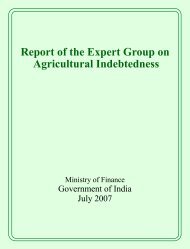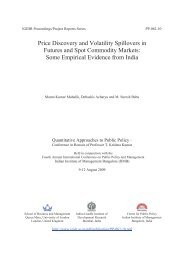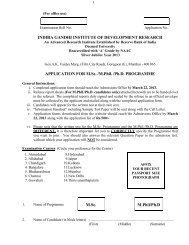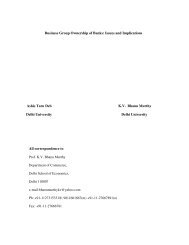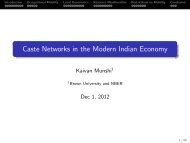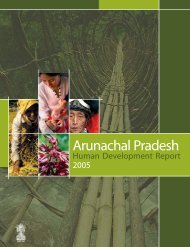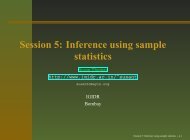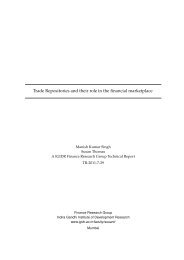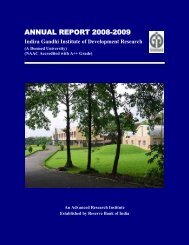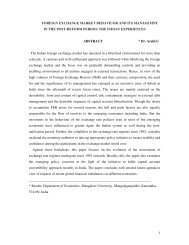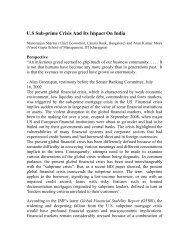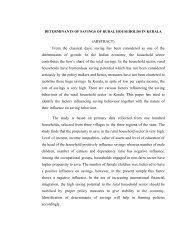Kerala 2005 - of Planning Commission
Kerala 2005 - of Planning Commission
Kerala 2005 - of Planning Commission
Create successful ePaper yourself
Turn your PDF publications into a flip-book with our unique Google optimized e-Paper software.
CHAPTER 10<br />
BY WAY OF CONCLUSION: SUGGESTIONS AND RECOMMENDATIONS<br />
165<br />
performed an important role in making the state literate,<br />
sending children to school and give priority to their health<br />
care requirements. The demographic transition owes at<br />
least partly to this.<br />
impact on the society (encouraging sex trade and<br />
drug trafficking), economy (very little benefits to local<br />
communities) and environment (littering and pollution)<br />
<strong>of</strong> the region (Jithendran and Baum, 2001). A mission<br />
mode approach with a time-bound plan, for what has<br />
come to be termed as ‘sustainable tourism’ is called for<br />
to institutionalise a system which aims at improving the<br />
material and non-material well being <strong>of</strong> communities<br />
through the involvement <strong>of</strong> local resources/communities<br />
in the tourism programme, protecting biological diversity<br />
and emphasising environmental sanitation consisting <strong>of</strong><br />
waste disposal, treatment and management. The rush<br />
for rapid tourism and its ‘commercialisation’ needs to<br />
be discouraged. All available sources <strong>of</strong> financial and<br />
technical assistance should be tapped for promoting<br />
’sustainability oriented’ tourism.<br />
Similarly while adopting steps to raise agricultural<br />
productivity as part <strong>of</strong> a growth strategy, as for instance in<br />
the case <strong>of</strong> cashew cultivation in north <strong>Kerala</strong>, given the<br />
growing demand for cashew kernels inside and outside<br />
the country since the 1990s, the impact <strong>of</strong> pesticide use<br />
on human well being has to be an important matter for<br />
consideration. Recent reports have brought out the fact<br />
that the continuous application <strong>of</strong> pesticides, such as<br />
endosulfan in this case, through aerial spraying on cashew<br />
plantations has impacted negatively on the health <strong>of</strong> the<br />
human population (Rajendran, 2002).<br />
4. Gender Freedom and Unfreedom<br />
<strong>Kerala</strong>’s record in achieving high human development<br />
even at low levels <strong>of</strong> income is commendable also from the<br />
point <strong>of</strong> its gender dimension. In fact in many respects, girls<br />
and women perform better than their male counterparts. It<br />
is no exaggeration to say that women’s agencies in <strong>Kerala</strong><br />
However, such high levels <strong>of</strong> human development <strong>of</strong><br />
women have not translated to comprehensive gender<br />
freedom. More than anything else, this is evident in<br />
the high incidence <strong>of</strong> unemployment especially <strong>of</strong> the<br />
school educated. As Chapter 7 has shown, the incidence<br />
<strong>of</strong> unemployment among women with 8 to 12 years <strong>of</strong><br />
education (middle to secondary levels) is two-and-half<br />
to four times higher than men with similar educational<br />
attainments in rural and urban areas, respectively. Labour<br />
market discrimination is revealed through the narrow<br />
range <strong>of</strong> employment opportunities and a very low work<br />
participation rate. However, in opportunities opening up<br />
for them as for instance in the IT sector, tourism sector,<br />
as sales assistants in shops/establishments or as emigrant<br />
nurses, the vulnerability <strong>of</strong> women has to be well<br />
recognised and their safely/security ensured.<br />
From both an economic and social point <strong>of</strong> view, it is<br />
a major challenge to tap the energy and talent <strong>of</strong> young<br />
educated women in <strong>Kerala</strong>. From the point <strong>of</strong> State<br />
policy, there is need for the development <strong>of</strong> employable<br />
skills for the currently unemployed and underemployed.<br />
Given the fiscal constraints <strong>of</strong> the government, it may<br />
not be feasible to rely entirely on government budgetary<br />
allocations. A policy initiative is called for to provide<br />
a framework for promotion <strong>of</strong> skills with appropriate<br />
arrangements for certification to ensure high quality<br />
standards. In such a framework, private, as well as the<br />
non-pr<strong>of</strong>it sector participation is desirable to establish<br />
training institutions.<br />
It is the relatively poorer sections that experience high<br />
incidence <strong>of</strong> educated unemployment because their<br />
educational attainments are not high enough to secure<br />
regular jobs. A partial solution to this problem is possible<br />
through the strengthening <strong>of</strong> the Kudumbashree programme<br />
through which a sizeable section <strong>of</strong> women from<br />
relatively poorer households have been organised through<br />
self-help-groups. The programme is capable <strong>of</strong> up-scaling<br />
in terms <strong>of</strong> training for skills, development <strong>of</strong> a common<br />
brand that would stand for quality, management <strong>of</strong> the<br />
small enterprises initiated by women, common marketing<br />
and related support system and a whole host <strong>of</strong> initiatives<br />
that would address the twin problems <strong>of</strong> unemployment<br />
and poverty interpreted in the sense <strong>of</strong> generalised<br />
deprivation discussed in this Report.



